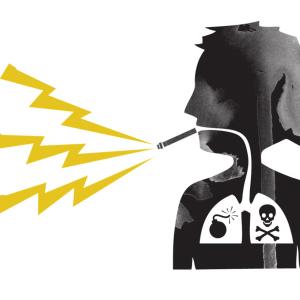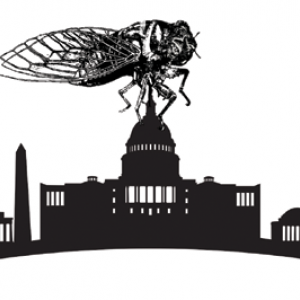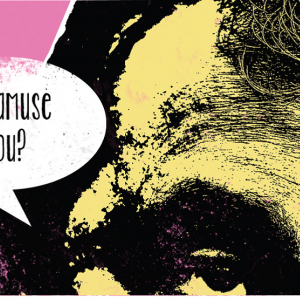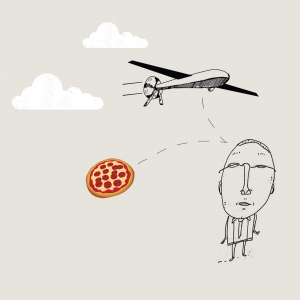
Ed Spivey Jr. was working as art director of the Chicago Sun-Times Sunday Magazine in 1974 when God called him to join the fledgling Sojourners community and work for its publication, then called the Post-American. The fact that Ed has not heard from God SINCE is not what’s important here, because Ed figures God had other things to do, what with making the world a more peaceful place. Why the world is still not a more peaceful place is none of Ed's business and he would never think to criticize God for slacking off since, who knows, God could have been sick or something.
But, 46 years later, Ed finally retired from Sojourners, content to have fulfilled his life-long dream of working hard for very little money. The only downside is that Ed is too old now to pursue his childhood plans of being either a cowboy or an astronaut. But such are the sacrifices one makes when one responds to the call of the Lord, even if immediately after that, the Lord apparently changed His or Her phone number.
Of a more biographic note, Ed holds an associate degree from Vincennes University. He then transferred to Indiana University where, despite his diligence at attending several classes each semester, he was denied a bachelor’s degree because a psychology professor did not appreciate Ed’s refusal to complete his rat experiment. Apparently, Ed’s was the only laboratory rat that bit, so Ed insisted on wearing thick motorcycle gloves when handling the animal which, the professor insisted, skewed the rat’s response to stimuli. Ed told the professor what he could do with stimuli, which unfortunately did not put the professor in the mood to accept Ed’s alternative suggestion, which was to study the response of rats being loudly cursed at while simultaneously being flushed down university toilets.
Since his college days he has made a bit of a name for himself, and not just “You, There,” which is the name his mother called him when she forgot. Ed won numerous awards for his design of Sojourners magazine, and his monthly humor column consistently garnered top honors from both religious and secular media associations. His book A Hamster is Missing in Washington, D.C. won the top prize in humor at the Independent Publisher Book Awards in New York City. (Due to scheduling conflicts, Ed was unable to attend the gala banquet, but had he gone he would have ordered the fish.) The book sold out of its second printing and Ed is now working on a second volume.
Ed is married and has two daughters, all of whom refuse to walk in public with him, on account of the little whoop-whoop sound he makes when he sees a fire truck. His beloved granddaughter, however, likes it when he does this.
Posts By This Author
Google THIS, Google
Resistance is futile. (Plus, it's time-consuming. So, never mind.)
IN THE FEW months remaining before our lives are completely taken over by computers, there’s still time to join the Resistance. Or start one, since most of us are unaware of the need to do so. I personally haven’t noticed because I’m waiting for my first heart attack to teach me how precious life is.
You’ve probably missed the warning signs because you’ve been too busy tweeting or friending people on Facebook. These seemingly innocent acts—designed mainly to reduce productivity at the office—are helpfully consolidating personal data for the ever-watchful mainframes to harvest later. And when the computers finally reduce us to a subservient species, unfriending them won’t save you.
Just to be clear, I’m not talking about the federal government’s massive monitoring of our phone calls, an effort that revealed most human conversation is not worthy of the monthly fees charged by Verizon, AT&T, or that new prepaid service called Boost, which I first thought was a nutritional supplement for old people. (The guy behind the counter looked at me funny when I asked what flavors it comes in. And when he tried to explain “pay as you go,” I was confused. With nutritional supplements, you pay, then you go, a little later.)
BUT THE GREATER threat is the increasing pervasiveness of artificial intelligence, probably the worst artificial substance ever created, if you rule out Cool Whip.
Two Guys Walk into a Bar
When I get tired of talking to myself, I talk to strangers. (Lucky strangers.)
FOLLOWING IS a conversation between an aging, award-winning humor columnist and a young man who, in his short life, probably only earned an award for Most Tattoos On One Arm.
Me: Excuse me. What’s that metal thing in your mouth?
He: It’s an electronic cigarette.
Me: Dude, you can’t smoke in here. Even if we’re the only ones in this hotel bar, and although it harkens back to simpler times, a time when men were men, and ...
He: There’s no smoke, just steam. It’s a noncombustible cigarette.
Me: Cool phrase that, “noncombustible cigarette.” Yours?
He: Nah. I heard it on a commercial. Some people call it an e-cigarette.
Book Groups For Dummies
"A Brief History of Time" is a great read, especially the one page I understood.
AS AN occasional participant in a book group, I’m happy to report that the wine at the last one was pretty good. Also the fellowship, the spirited conversation, and, finally, before we ran out of time, discussion about the book, which consisted mainly of how most of us didn’t finish it, or start it. In my case, however, I couldn’t put it down.
It was The Lost City of Z, a recounting of an intrepid explorer’s frightening ordeals in the unforgiving jungles of the Amazon, which ultimately ended when he succumbed to cannibalism. It was a chilling read, one that convinced me to confine my travels exclusively to the continental United States. Because if there’s anything that ruins a good walk, it’s being eaten by your own species. According to the book, at the turn of the last century certain tribes in remote South America believed they could spiritually cleanse themselves by devouring their enemies. (Fortunately, that practice has died out, except for in a few red states during primary season.)
I read every word of that book, usually with the covers pulled tightly around me and all the lights on, while making sure that I didn’t appear delicious to anyone in the vicinity.
Pulling Yourself Up by Your Bootstraps...
...like the Koch brothers, who have really nice bootstraps.
WITH THE NEXT election still almost 18 months away, you’d think the media would focus on more important topics in the meantime, such as where Kim Kardashian is spending her next vacation.
But you’d be wrong. It’s officially time for the press to ignore more newsworthy subjects in favor of endless coverage of the election “horse race,” but without the legendary good sense horses bring to such occasions.
ISIS on the move, taking the Middle East back to the 7th century? Forget that. Let’s talk about Jeb Bush’s 2016 run, although the hook could be how ISIS reminds people of the disastrous policies of the last Bush in the White House. Or was it the one before that? I can’t remember. (In hindsight, the Bush parents should have named alltheir sons George, so presidential ballots could be printed in bulk, enough for several elections.)
First World Problems...
Saints (and sinners) around the water cooler
WHEN YOU WORK for a Christian justice organization, it’s hard to complain about your petty personal problems. Dishwasher leaving spots on the glassware at home? Don’t mention it in the office or you get called out for a “First World problem.” Not happy with your cable company? “Dude, First World problem!” retorts a colleague, pouring coffee into his Amnesty International mug before a meeting on income inequality.
I work with people who have traveled the world working for peace and freedom, who have spent time in jail for their beliefs, but who show no sympathy when L.L. Bean messes up my order. (I purchased the medium winter pullover from their activewear collection, but they sent me a small. And it pinches when I lift my arms to pray during chapel.)
In short, my peers are saints working for a better world. And fortunately for them, they don’t have to look outside the office to see what’s wrong with that world, for I walk among them. I am he (or maybe him), the self-centered manchild whose personal preoccupations give a counterbalance to the righteous intentions of my colleagues. It’s a dirty job, but somebody’s got to do it.
And that somebody needs new kitchen cabinets.
Like Giant Marshmallows on a String
Another great idea from our patriotic defense contractors
IF YOU’RE TRAVELING by air to Washington, D.C., this winter, be sure to look out your window. You don’t want to miss the lovely patchwork of monuments that covers the city, or the scenic curves of the Potomac River, or the giant dolphin-shaped balloons within arms-reach of your seat in coach. But don’t try to pet them. Setting aside the problem of rapid decompression if you open a window, the balloons are property of the U.S. Army, and they don’t like people touching their stuff.
The balloons—I call them balloons, although they’re actually reconnaissance blimps designed to warn against hostile missiles—float about 10,000 feet above the ground, tethered by inch-wide cables, presumably not held on the other end by children at, say, the zoo. Each blimp looks like a huge white dolphin with an unfortunate—and apparently undiagnosed—abdominal growth protruding from its belly. Clearly, it’s something a qualified medical professional should look at. Of course, if it’s just a navel, there’s no problem. But it’s definitely an outie.
There are two of these blimps, each 243 feet long and weighing, well, nothing, because they’re filled with helium, the gas that would have been used in the Hindenburg had the construction crews been smokers. (Smokers may not be smart, but they’re fast learners.) The blimps float above the Aberdeen Proving Grounds, just outside D.C., in some of the busiest airspace on the East Coast, and trail about two miles of cable connected to the ground. What could possibly go wrong?
Meet the New Boss (looks familiar)
From one grim-faced, aging, white guy to another
IN MID-JANUARY, the gavel of power will change hands in the U.S. Senate. Mitch McConnell, in a touching act of cross-party reconciliation, will reach across the aisle and forcefully pry the symbol of legislative authority from the desperate grip of Harry Reid. Although the outgoing majority leader said after the midterms, “I have been able to strike a compromise with my Republican colleagues, and I’m ready to do it again,” Reid later clarified that what he meant was the compromise he would strike would be across the knuckles.
After warding off repeated blows, however, McConnell will be the new leader of the Senate, a massive change in political power that will go virtually unnoticed to the public, since he and Reid are both grim-faced, elderly white men whose rare smiles cause parents to cover their children’s eyes and bring their pets indoors.
Indistinguishable in their sour demeanors, they are like brothers separated at birth: two joyless Caucasian babies muttering in their hospital cribs, already soured by the knowledge their lives will be spent in fruitless conflict, the only bright spot being they’ll have comfortable leather seating at work.
Both men are well into their seventh decade, with most of their adulthood spent in politics, another reminder that the true power of incumbency is simply outliving everybody else.
A Winter to Remember, Beforehand
The Old Farmer's Almanac never lies. (It guesses, but that's not lying.)
AS WE BLITHELY head into what we assume will be another warm winter—given the effects of global warming denied only by the ExxonMobil wing of Congress—we would do well to heed the warning of the nation’s oldest weather forecaster. According to the Old Farmer’s Almanac, the coming winter will be particularly cold, with deep December snows to write home about, if you can get to the mailbox.
I first heard this forecast on the radio, driving home from another of the many craft festivals we attended this fall. We enjoy the talented local musicians and artisans, the copious amounts of free samples, and the chance I get at every handmade soap tent to complain that their cheese tastes funny. (I love doing that. It never gets old.)
The only drawback to fall festivals is the unavoidable encounter with dulcimer players. I listen politely for as long as I can stand it, then cry out, “Can you play ‘Free Bird’ on that thing?!” I do this to restore my sanity, if only for a moment. With its gentle, bell-like tones, dulcimer music is like a droning mosquito that you can’t kill. (The main problem with a hammer dulcimer is the hammer is too small and not made of metal. And they don’t hit it hard enough. I would hit it much harder.)
How Would Jesus Vote?
The people have spoken, usually during dinnertime.
WITH THE CRUCIAL midterm elections less than a fortnight past, many Americans are wondering what “fortnight” means, because it sounds really cool on Downton Abbey. Well, it means two weeks, and that’s hardly enough time to develop the regret appropriate to the choices you made at the polls.
But why wait for that inevitable sinking feeling about your latest destructive act against democracy? Let’s get a jump start on your anxiety by reading through a recent poll asking Americans how Jesus would weigh in on issues of the day.
Let the disappointment begin.
As a devout Christian—you can put down your American flag, we know who you are—you regularly ask yourself, “What would Jesus do?” And who better to advise you than Jesus himself, or the best representation of God’s son that modern technology can provide: the telephone survey.
You know, that thing that happens when you’ve just sat down to eat dinner after already getting up twice, once for the cracked pepper you forgot and again to replace the bent fork that you always seem to end up with. Then you finally start to say grace AND THE DARN PHONE RINGS!! (Jesus calls us to follow him. The survey guy calls us at dinner time.)
The Year in Review. (Too Soon?)
Where were the bugs? We were supposed to get lots of bugs.
IT’S A LITTLE early to be looking back at the past year, but I have to say I’m very disappointed in 2014. It was supposed to be the Year of the Cicada, a time when millions of fat little bugs would emerge from the ground and loudly buzz around the nation’s capital, possibly joining the chorus to impeach the president. (The cries for impeachment haddeveloped a definite bug-like drone.)
Every 17 years or so, the cicadas are supposed to emerge from the ground where they have been gestating and, for the first week of their debut, bring a welcome distraction to life’s problems. By week two, however, they’ve become life’s problems, striking your head and other body parts as you walk outside, or even inside if you leave the screen door open too long for a cat who just ... can’t ... decide.
Fortunately, they all die after a couple weeks, but then venturing out into your backyard sounds like walking on corn flakes, if corn flakes were green and disgusting, and dead.
But none of that happened this year. Instead of the fun and natural wonder of watching bugs freeing themselves from their dark captivity and flying forth into the glorious light of day, we got nada.
No sitting on the front porch watching cicadas celebrating their new world or becoming lunch to passing birds, whichever comes first; no entomological moment of awe; no opportunity to provide learned commentary on nature’s brutal cycle of life to a wide-eyed grandchild. (“So that’s why you should stay in school and not take drugs.”)
The Party of Pink
America should be like a box of crayons, but with fewer colors.
WHEN MARK TWAIN supposedly said “reports of my death have been greatly exaggerated,” he didn’t know he was establishing a tweet for the ages. (He didn’t use Twitter. He was more of an Instagram guy.) It still stands as the best rejoinder to those who insist on seeing things for what they aren’t.
Politically speaking, pundits and legislators alike were guilty of prematurely identifying the cold carcass of the tea party last spring when establishment Republicans defeated their right-wing rivals in several primaries. Then came Eric Cantor who, as a Jew, never really fit the profile of an evangelical Christian, the preferred qualification for tea party membership. But as majority leader of the House, he was powerful and occasionally clear-spoken, two other characteristics not often found in tea party favorites.
Nonetheless, Cantor went down to defeat at the hands of an underfunded college professor whose only apparent advantage was a more-evangelical hair style. But his secret weapon was his intolerance for undocumented workers, a favorite position for tea party Americans whose food is harvested almost exclusively by undocumented workers. But let’s not quibble. People are entitled to their opinions, even if the food on their plates sits in mute repudiation of those beliefs. (Luke said “the stones will cry out,” but I’d be happier if a bowl of vegetables would just stand up and say a few cryptic words before dessert.)
So now Eric Cantor’s political career is over, and he moves on to the pitiable life of a wealthy lobbyist who, through no fault of his own, must replace a deep sense of social responsibility with a couple really nice cars. Better that than the consequences for Cantor’s pollster, who predicted a 34 percent victory for his boss. (“Clean-up on aisle 12.”)
A License to Pray
"Please report to Window #12. And bring your Bible."
THE RECENT Supreme Court ruling permitting prayer at government functions holds many ramifications for our day-to-day life, such as getting a comfortable seat at the city council meeting before the clerk starts reading the entire book of Revelation.
In writing for the majority, Justice Anthony M. Kennedy held that public prayer is “deeply embedded in the history and tradition of this country” and should be permitted as a ceremonial practice. Like, maybe at the D.C. Department of Motor Vehicles:
Driver: I’m here to renew my driver’s license.
DMV clerk: Let us pray.
Driver: Excuse me?
DMV clerk: With every head bowed, and every eye closed, we pray to the Lord Jesus Christ that his love will pour out on this driver, and by the grace of the Living God, he will always come to a complete stop, when appropriate.
They've Got Your Number...
...And they're using it for themselves.
I’VE BEEN SPENDING a lot of time with my credit card company lately. Nice people work there, of course, and I try to make every phone call a time of conviviality and respect. It’s what good people do.
Credit card guy: Sir, my name is Brian, and ...
Me: No, it’s not.
“Brian”: I beg your pardon?
Me: Be honest. They give you anglicized names to sound more American, right? So when did you get that name?
“Brian”: When I was born. It’s also my father’s name.
Me: And, you’re calling from, like, Mumbai or ...
Brian: Texas.
Me: [awkward moment of silent self-loathing, mercifully cut short by seeing a butterfly. Pretty.]
But you readers understand my point. American jobs should be for Americans. Honest, God-fearing Americans who embody the spirit of freedom and entrepreneurship. Like the guy in Kansas who, according to Brian, had just purchased an iPad with my credit card number. Brian was calling from Texas to make sure this was okay with me, which it wasn’t.
Don’t get me wrong. I’m all for buying an iPad or any of the high-tech gadgets that I’ve had my eye on. And I totally get that the guy in Kansas feels the same way. In fact, I was cool with him right up to the point where he decided to keep it for himself.
Exporting Democracy...
...although maybe we should have kept a little for ourselves.
FOR MORE THAN two centuries, the United States has been the proudest example of democracy in the world. Maybe not the best, but definitely the proudest. Oh sure, we’ve hit some rough patches over the decades, mainly in dealing with our native peoples and other ethnic minorities. Also with women, the poor, the falsely accused, the unemployed, and people who aren’t bankers. But let’s just call those growing pains.
For the most part, America has been that shining city on a hill, and by America, of course, I don’t mean Canada or Mexico, or the other countries whose names I forget, most of which don’t have many good hills to shine from anyway.
But I’m not talking about geography, I’m talking about pride. The pride that comes from being number one in democracy, despite being number 55th in infant mortality and 35th in math. Okay, so we don’t test well. But we’re proud anyway. And we’re still number one in Bible science! [High five!]
But lately, because of continued dysfunction on Capitol Hill, people are starting to whisper that democracy in the United States may have lost some of its shine, like we’re “hiding it under a bushel,” as it says in the old Christian campfire song of my youth. (We also sang “With Jesus in My Boat I Can Ride Out the Current Economic Downturn,” and “Children, Go Where I Text Thee.”)
But if America’s “little light” is no longer shining, at least a few other nations are providing good examples of self-government.
One Hump or Two?
Another test of biblical authority by unscrupulous scientists
RESEARCHERS from Tel Aviv University recently announced a discovery that could shake the foundations of biblically based history currently taught in most states below the Mason-Dixon line (otherwise known as “Jesus Country,” unless Jesus comes back without a photo ID).
Granted, biblical controversies may not be the most important thing to you right now, when you’re coming up with this year’s excuse why your new beach body won’t be ready by Memorial Day. But we should never shirk from scholarship that could deepen our faith or, short of that, allow us to use the phrase “camel bones” for the first time in our lives.
To wit: Using carbon-dating techniques to determine the age of the world’s oldest-known camel bones, researchers have determined that camels could not have been the pack animals referred to in much of the Old Testament. At that time, camels had not yet been introduced to the region. It’s not clear if camel introductions were something that just wasn’t done in polite company or if the dearth of camels was only alleviated by Egyptian merchants establishing Mediterranean trade routes. But the latter would be my guess and is, in fact, the conclusion of the Tel Aviv researchers.
And it’s good we see eye-to-eye with the scientists on this particular issue, since their method is one I hold in contempt. I took it personally when carbon dating was used to disprove that the Shroud of Turin displayed the real image of Jesus Christ. I believed in the Shroud. When preachers would sermonize on faith the size of a mustard seed, I would smile condescendingly, because my faith was bolstered by something big enough to cover a good-sized twin bed! And with a picture of Jesus on it! (Much cooler than Justin Bieber or a Disney princess.)
I’ve never believed much in carbon dating since then. Speed dating, maybe. But not the other thing.
A Bridge Too Far? Not Likely.
It's only New Jersey. So fugetaboutit.
SINCE THE 2014 election could be the most decisive political moment in a generation, the most important question is: Who will be Hillary's running mate in 2016?
The second big question is: What else does Chris Christie have to do to make other Republican presidential hopefuls slip back into the woodwork? What part of “you want a piece of me?” don’t they understand? Have they no fear of—just to choose something at random—major traffic delays in their districts? Are they currently enjoying their drinking water or other public utilities? Do they like their kneecaps?
A bit harsh, perhaps, especially regarding a man whose political obituary is already being written, and whose Wikipedia entry may one day not start with “45th president of the United States,” but with the phrase “Angry Birds spokesperson.”
But Chris Christie is a survivor. He may be only six Twinkies away from not being governor of New Jersey (assuming that he eats them all in one sitting), but he enjoys a strong approval rating and, at this writing, is still innocent of all accusations against him, including humility. His only real threats for the nomination are Paul Ryan and Jeb Bush, who is currently trying to be adopted by a family with a different last name.
The influence scandal that has roiled Christie’s staff and highlighted his strong negatives happened, after all, in New Jersey. And what happens in New Jersey stays in New Jersey because, for their own protection, witnesses tend to fugetaboutit.
Adapt or Die
Okay, so maybe not actually die. Just change. And quickly.
THIS YEAR IS shaping up to be one of enormous transition, although nothing specific comes to mind right now. I’ve just got this gut feeling. But the word that will best guide us through the coming changes may be “adaptation,” which my copy of the Merriam-Webster Dictionary defines as “the process of changing to fit some purpose or situation.” My copy of the dictionary also wants me to know how grateful it is to be picked up from behind the bookshelf where it had fallen years ago. It wedged against a hot-water pipe and got kind of u-shaped.
It actually felt good to look up something in hard copy, even if the pages were warm and wrinkled. But using Google is much faster, even subtracting the time it takes to first sing the alphabet song to remind me what order the letters are in. The point is, dramatic changes will be happening to our world, and we either adapt to them or die.
Okay, maybe not die. But when Brand New becomes No Turning Back, there’s no point in resisting. This year, for better or worse, “I don’t wanna” will become “but I hadda.”
My family has already started making the necessary changes. We have no fireplace in our home, since our house was built before the discovery of fire, and thus we have no chimney for Santa to come down. But last Christmas we adapted. We hung the stockings from the microwave, then left the door open and hoped for the best.
Donating My Body to Science
No animals were tested in the study. Just me.
AS A TEST subject in an ongoing medical study, I can report with confidence that, so far, I’m still alive—an important variable in research that measures the effect of Vitamin D and fish oil on heart health. At least, that’s the stated purpose. But, after taking the pills every day for two years of the five-year study, I’m thinking there may be something else going on.
It’s called a “vital study,” and it’s being run by the Harvard Medical School, a prestigious institution that typically leaves your average research projects to lesser entities, such as the federal government. But this is a “vital study,” and if Harvard is involved it must be big, probably top secret. And it chose me for a reason (other than my awesome averageness, of course).
But why? I admit I’m an older white male, the main population for the study, but since our contact has been exclusively by email, how did Harvard know? Were they tipped off by my habit of Googling subjects like calcium retention, wrinkle removal, and the name of the woman on Gilligan’s Island who wasn’t the movie star. (Editor’s Note: Mary Ann.) Doh!
Perhaps Harvard used email as a clever ploy to mask the fact that they’ve been closely monitoring me for years, observing my selfless nature and noble commitment to the greater good, except when I’m driving. To Harvard, I must have seemed the ideal subject for a secret project to build a lean, mean, elderly fighting machine!
Getting Real for the New Year
Don't make promises you can't keep.
THIS IS OUR first issue of the new year, and with the new year comes new challenges, new hopes, and new promises which, in order of appearance, you may not live up to, will probably fail to realize, and may never keep. Fortunately, this January issue comes out in early December, several weeks before most self-delusions begin to surface, so there’s still time to change them all, thus saving face. And here in Washington, D.C., saving face is very important. Living up to challenges, not so much. But saving face? We understand.
So let’s get started with turning your future failures into successes and your future frowns into smiles, which are just frowns turned upside down, depending on whether you’re standing on your head at the time.
The point is, you don’t have to make the same mistakes again this year, because we can stop your resolutions before you make them. We can nip failure in the bud, because failure is just eruliaf turned upside down. Or possibly backward. Regardless, following is a short list of things you may have pledged to do this year. Think again.
Lose weight. Right. Sure. Whatever. Not going to happen. So stand up straight and hold your stomach in until your friends walk by. Then breathe. And remember: You’re not too fat. You’re just too short.
Not So Merry Christmas
Sorry, kids, but Santa has some bad news.
DESPITE THE heart-felt and hand-written requests from thousands of American children in their Christmas letters, Santa has just announced he cannot bring them a new Congress this year. He tried, Santa wants us all to know; he tried hard. But he and his elves finally gave up when even the parts imported from China couldn’t make the thing work.
They first attempted to construct something with U.S.-made components, but it was almost as if the parts didn’t want to work together, like they had minds of their own. This surprised the elves since Congress—which has no apparent moving parts—hasn’t had a sentient thought in years.
However, as a small concession to all those disappointed little children, Santa this year will be honoring Christmas wishes that have traditionally been difficult to fulfill.
If Sally from Shreveport can’t get a workable electoral body in the nation’s capital, then she gets a pony. Simple as that. She asked for it last year—in fact she’s been asking for a long time—but this year she’ll get it. If her parents are not sure what to do with a 600-pound animal that requires constant attention and care, then maybe next time they’ll think twice before voting for a member of Congress who wears a three-cornered hat and proudly refuses to be treaded on, even though nobody’s trying.



















